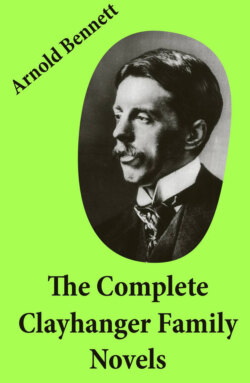Читать книгу The Complete Clayhanger Family Novels (Clayhanger + Hilda Lessways + These Twain + The Roll Call) - Arnold Bennett - Страница 174
На сайте Литреса книга снята с продажи.
Five.
ОглавлениеHe seized his overcoat and hat, and putting them on anyhow, strode out. The kitchen clock struck half-past seven as he left. Chapel-goers would soon be returning in a thin procession of twos and threes up Trafalgar Road. To avoid meeting acquaintances he turned down the side street, towards the old road which was a continuation of Aboukir Street. There he would be safe. Letting his overcoat fly open, he thrust his hands into the pockets of his trousers. It was a cold night of mist. Humanity was separated from him by the semi-transparent blinds of the cottage windows, bright squares in the dark and enigmatic facades of the street. He was alone.
All along he had felt and known that this disgusting crisis would come to pass. He had hoped against it, but not with faith. And he had no remedy for it. What could he immediately and effectively do? He was convinced that his father would not yield. There were frequent occasions when his father was proof against reason, when his father seemed genuinely unable to admit the claim of justice, and this occasion was one of them. He could tell by certain peculiarities of tone and gesture. A pound a week! Assuming that he cut loose from his father, in a formal and confessed separation, he might not for a long time be in a position to earn more than a pound a week. A clerk was worth no more. And, except as responsible manager of a business, he could only go into the market as a clerk. In the Five Towns how many printing offices were there that might at some time or another be in need of a manager? Probably not one. They were all of modest importance, and directed personally by their proprietary heads. His father’s was one of the largest... No! His father had nurtured and trained, in him, a helpless slave.
And how could he discuss such a humiliating question with Hilda? Could he say to Hilda: “See here, my father won’t allow me more than a pound a week. What are we to do?” In what terms should he telegraph to her tomorrow?
He heard the rapid firm footsteps of a wayfarer overtaking him. He had no apprehension of being disturbed in his bitter rage. But a hand was slapped on his shoulder, and a jolly voice said—
“Now, Edwin, where’s this road leading you to on a Sunday night?”
It was Osmond Orgreave who, having been tramping for exercise in the high regions beyond the Loop railway line, was just going home.
“Oh! Nowhere particular,” said Edwin feebly.
“Working off Sunday dinner, eh?”
“Yes.” And Edwin added casually, to prove that there was nothing singular in his mood: “Nasty night!”
“You must come in a bit,” said Mr Orgreave.
“Oh no!” He shrank away.
“Now, now!” said Mr Orgreave masterfully. “You’ve got to come in, so you may as well give up first as last. Janet’s in. She’s like you and me, she’s a bad lot,—hasn’t been to church.” He took Edwin by the arm, and they turned into Oak Street at the lower end.
Edwin continued to object, but Mr Orgreave, unable to scrutinise his face in the darkness, and not dreaming of an indiscretion, rode over his weak negatives, horse and foot, and drew him by force into the garden; and in the hall took his hat away from him and slid his overcoat from his shoulders. Mr Orgreave, having accomplished a lot of forbidden labour on that Sabbath, was playful in his hospitality.
“Prisoner! Take charge of him!” exclaimed Mr Orgreave shortly, as he pushed Edwin into the breakfast-room and shut the door from the outside. Janet was there, exquisitely welcoming, unconsciously pouring balm from her eyes. But he thought she looked graver than usual. Edwin had to enact the part of a man to whom nothing has happened. He had to behave as though his father was the kindest and most reasonable of fathers, as though Hilda wrote fully to him every day, as though he were not even engaged to Hilda. He must talk, and he scarcely knew what he was saying.
“Heard lately from Miss Lessways?” he asked lightly, or as lightly as he could. It was a splendid effort. Impossible to expect him to start upon the weather or the strike! He did the best he could.
Janet’s eyes became troubled. Speaking in a low voice she said, with a glance at the door—
“I suppose you’ve not heard. She’s married.”
He did not move.
